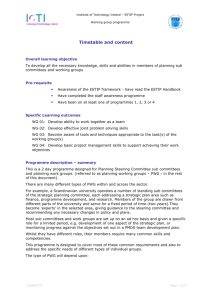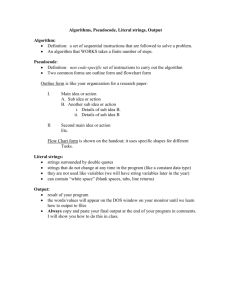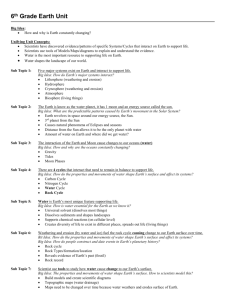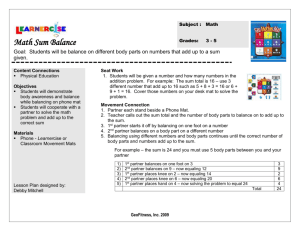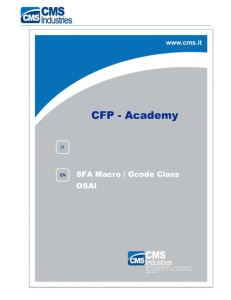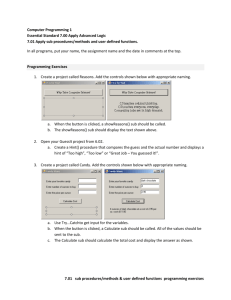Programme 3 - Timetable and content (31 Mar 09)
advertisement
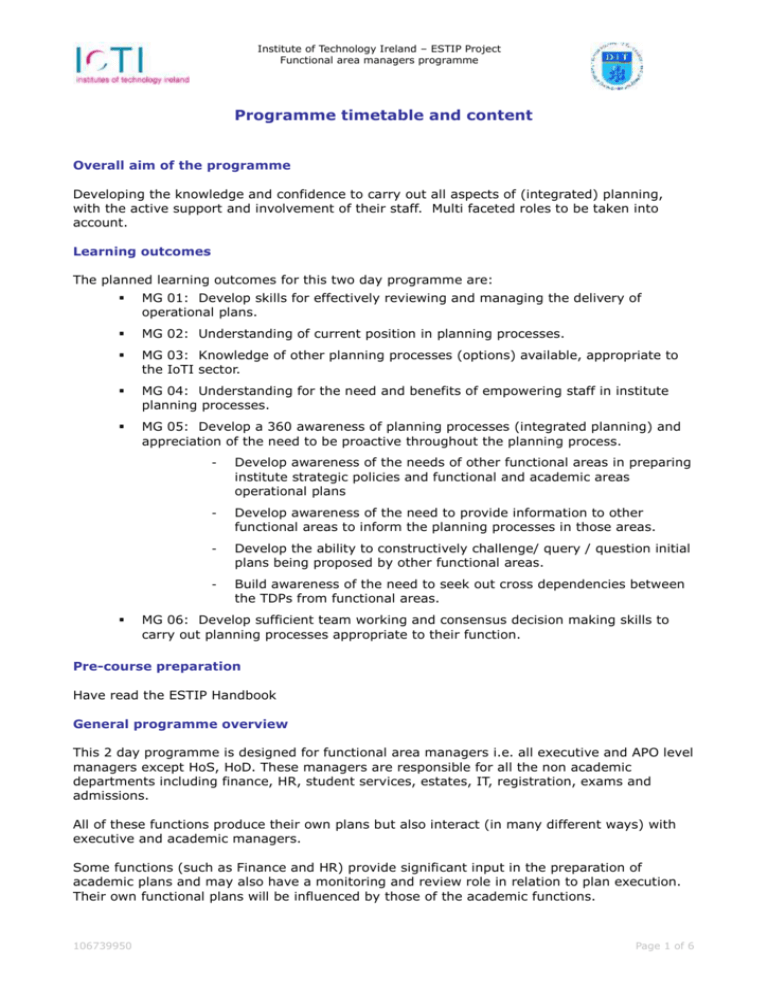
Institute of Technology Ireland – ESTIP Project Functional area managers programme Programme timetable and content Overall aim of the programme Developing the knowledge and confidence to carry out all aspects of (integrated) planning, with the active support and involvement of their staff. Multi faceted roles to be taken into account. Learning outcomes The planned learning outcomes for this two day programme are: MG 01: Develop skills for effectively reviewing and managing the delivery of operational plans. MG 02: Understanding of current position in planning processes. MG 03: Knowledge of other planning processes (options) available, appropriate to the IoTI sector. MG 04: Understanding for the need and benefits of empowering staff in institute planning processes. MG 05: Develop a 360 awareness of planning processes (integrated planning) and appreciation of the need to be proactive throughout the planning process. - Develop awareness of the needs of other functional areas in preparing institute strategic policies and functional and academic areas operational plans - Develop awareness of the need to provide information to other functional areas to inform the planning processes in those areas. - Develop the ability to constructively challenge/ query / question initial plans being proposed by other functional areas. - Build awareness of the need to seek out cross dependencies between the TDPs from functional areas. MG 06: Develop sufficient team working and consensus decision making skills to carry out planning processes appropriate to their function. Pre-course preparation Have read the ESTIP Handbook General programme overview This 2 day programme is designed for functional area managers i.e. all executive and APO level managers except HoS, HoD. These managers are responsible for all the non academic departments including finance, HR, student services, estates, IT, registration, exams and admissions. All of these functions produce their own plans but also interact (in many different ways) with executive and academic managers. Some functions (such as Finance and HR) provide significant input in the preparation of academic plans and may also have a monitoring and review role in relation to plan execution. Their own functional plans will be influenced by those of the academic functions. 106739950 Page 1 of 6 Institute of Technology Ireland – ESTIP Project Functional area managers programme Other functions, such as libraries, estates and student services will normally provide information to assist in academic plan development and will then develop their own plans of which a major part is how to support the academic plans. The programme will help managers develop their own functional plans and to assist them in setting up the necessary processes to influence and interact with academic plans. The critical success factors for this programme are: attendees must be able to relate the programme content to their own situation they need exposure to different and potentially better ways of organisational planning they need time to reflect on what changes or improvements they might be able to introduce after completing the programme they should have easy access to all the information they need without being swamped in detail they should be able to practice what they learn in a non risk, fun environment Summary programme timetable DAY 1 09.15 09.45 10.45 11.15 11.45 12.45 14.00 15.00 15.15 16.15 – – – – – – – – – – 09.45 10.45 11.15 11.45 12.45 14.00 15.00 15.15 16.16 16.30 Course Introduction – people introductions Planning Exercise – Ice Breaker Organisational Planning – self assessment exercise Break Plan Development module Lunch Plan change and review Break Plan integration – PMDS Summary of Day 1 – Reading assignment 09.15 09.30 10.30 11.00 12.00 13.00 14.00 14.30 15.15 15.30 16.30 17.00 – – – – – – – – – – – 09.30 10.30 11.00 12.00 13.00 14.00 14.30 15.15 15.30 16.30 17.00 Day 2 Introduction - Objectives, learning outcomes Developing functional plans Break Functional sub group workshops Delivering the plans – monitoring and review Lunch Empowering and engaging staff Facilitated group planning session Break Facilitated group planning session Summary, discussion, evaluation Close DAY 2 106739950 Page 2 of 6 Institute of Technology Ireland – ESTIP Project Functional area managers programme Programme content The introductory session includes a short presentation on the background to the ESTIP programme and an introduction to the documentation. (handbook, reports). The first session serves as an 'ice breaker' and an introduction to planning in the sector using a case study and group activities. The programme continues with a reflective, organisational self assessment exercise to start the thinking process. How well are we doing planning today in our Institute and in my function? The next stage will be to review current practice in developing academic plans in the higher education sector and then ask participants to study and critique a number of case studies. We will analyse and discuss their role in the plan development process. Further case studies / caselets will be introduced in the next session which addresses the way that plans should be reviewed and changed as circumstances change. Again, the group will be asked to consider and discuss their possible roles in the change and review process. The final session on the first day will cover the integration of strategic, operating and PMDS plan processes. How is it being done today, why change and what to do? The session will be based on sub group discussion using live, anonymised examples. The first session of the second day covers the development of plans for non academic functions. It explores the different links to the academic planning process and describes current and 'best' practice elsewhere. It links back to the earlier self assessment session and encourages participants to consider what, if any, improvements can be made in their own function – and what to do about it. Sub groups will be used as necessary in the follow on session to explore the different types of plans and processes referred to above e.g. a sub group of finance, HR and registrar to cover the more closely regulated functions and a group to cover other support services such as libraries, student services and estates. Having covered the development and updating of plans the next session covers plan delivery, including the ongoing monitoring and review processes. The session includes functional involvement in this stage of academic plans as well as managing delivery of their own plans. The final formal session addresses the crucial requirement to engage and motivate staff in the various planning processes. Original survey results (ESTIP project 1) for the sector will be reviewed an informal supplementary survey will be carried out as part of this session. The final session of the day (from 1430 to 1615) will be a facilitated discussion about the way forward for this group. Current and potential issues will be discussed with support from the facilitator who will also help develop an appropriate action plan. Groups will be asked to complete a course evaluation before close of the session at 1645. Module descriptor/ Trainer notes The original proposal was to develop up to three versions of this programme to reflect the differing roles outlined above. The current view is that about 80 to 90% of the programme would be relevant to all non academic managers and that the differences would be better covered in functional break out sessions on day two of the programme. 106739950 Page 3 of 6 Institute of Technology Ireland – ESTIP Project Functional area managers programme Course Introduction – people introductions Welcome Introductions tutor / participants Programme objectives / learning outcomes/ scope (SP, OP, PMDS TDP) Timetable Background to ESTIP introductory presentation ESTIP phases handbook and how to use introduce other data sources – report, international, manual Original survey results institute and sector (empowerment) Planning Exercise – Ice Breaker 'New business venture' exercise Discussion and feedback Objective is to de-mystify 'strategic planning' and reinforce need for it – and to facilitate ongoing group working during the programme. Relate it to everyday life by using a simple example. Group exercise to develop a strategic and operating plan for a new business venture (e.g. pizza parlour franchise) and then react to change Provide a quick scenario – separate teams to promote, evaluate and challenge Organisational Planning – self assessment exercise Objective is to help participants understand the main drivers for successful planning and evaluate their own Institute and function in this context. Participants asked to complete organisational self assessment questionnaire and email to tutor before course. Tutor presents summary result – focus on empowerment and programme effectiveness Small group discussion to identify issues and main improvement areas Structured plenary discussion to identify and agree process requirements, competencies to improve the planning process in their areas. Plan Development module Objectives are to teach the basics of how various plans are put together and explore their functional role in the process – inform, warn, assist, challenge etc depending on function. Show case studies and ask group's views on content and approach. Examine need to integrate strategic and operating plan processes with academic review processes. Introduce change elements in short, medium, long term time frames to illustrate how the plans evolve during the development phase. e.g. funding, government and HEA policy and programmes, international economic developments. Explore any additional competency and skill requirements within the non academic functions. 106739950 Page 4 of 6 Institute of Technology Ireland – ESTIP Project Functional area managers programme Plan change and review Objectives / learning outcomes – to gain an understanding of the various cross functional roles in the ongoing plan change and review process. Review the differing roles of cross functional groups in the plan change and review processes for strategic, operating and PMDS planning. Using scenario case studies explore some of the process implications of change – data gathering, communications, involvement in school reviews. Group and plenary discussion to identify 'best' practice for their own functions. Plan integration – PMDS Objectives / learning outcomes – to understand importance of integrating all aspects of the planning process and to assist the group in identifying areas for improvement and possible strategies to address them. Includes strategic, operational, academic and PMDS planning. Scenario caselets for sub groups to review, evaluate and critique – illustrating issues of plan credibility, staff empowerment, data duplication and conflict, unnecessary work. Review 'best practice' approach to plan integration and relate it to Institutes current plans and timetable – refer back to self assessment. - group and plenary discussions. Identify possible improvement areas and recommended approach to include processes, communications and skill requirements. Reading assignment Case study for session ' Developing Functional Plans' Day 2 Introduction – Objectives and learning outcomes Exercise Developing functional plans Objectives / learning outcomes - to gain a general understanding of the inter-relationship between the functional planning process and the academic planning process at all stages of development. To review the necessary processes at the specific, different function level. Structure The first sub module (1.5 hours) is for the combined functional participants. The second sub module (1 hour) is for sub groupings of non academic functions depending on their role (e.g. Secretary / Financial controller group including HR, Student services, development and planning) First sub module – combined session Responding to academic and other functional plans. Including own specific agendas, objectives, constraints. Ensuring effective communications. Reviewing and agreeing priorities with academic and other functions Handling disagreement, negotiations . 106739950 Page 5 of 6 Institute of Technology Ireland – ESTIP Project Functional area managers programme Case study to explore the above – discussion groups to identify differing roles of various cross functional groups and identify appropriate common 'best practice' approaches Second module – sub group workshops A number of sub groups (as appropriate) facilitated to discuss and agree specific issues, identify particular challenges, areas for improvement and planned actions to implement them. Identify potential constraints. Delivering the plans – monitoring and review Objectives / learning outcomes – to understand the need for the monitoring and review of delivery and how to optimise their functional role in the various processes. Discuss how the various plans of the Institute are monitored and reviewed today. Explore the current / optimum role of the different functions in monitoring and reviewing the plan delivery of academic functions Identify different approaches and discuss effectiveness of the process. Use a case study to review some of the most relevant approaches outlined in the ESTIP manual. Identify any requirement to change or improve monitoring and review processes (including data collection, communications, skill requirements) Discuss possible improvements and plans to achieve them. Sub groups to review own processes for monitoring and reviewing own cross functional plans. Plenary session to share ideas and best practice. Empowering and engaging staff Objectives / learning outcomes- to understand the need to empower and engage all staff in the planning process – with specific reference to functional groups. Refer back to the original ESTIP survey plus the self assessment questionnaire referred to above. Review a number of relevant suggestions from the ESTIP manual including involvement in planning sub groups. Facilitated sub group discussion on the specific challenges of involving multiple grade staff in non academic functions. Plenary discussion / tutorial session to identify possible improvement areas and initial plans to address. Summary and discussion Individual summaries of 'learner logs' Key messages summary Final questions, comments, discussion Course assessment Usually 15 minutes Allow 30 to 45 minutes for pilots with a more rigorous questionnaire 106739950 Page 6 of 6

